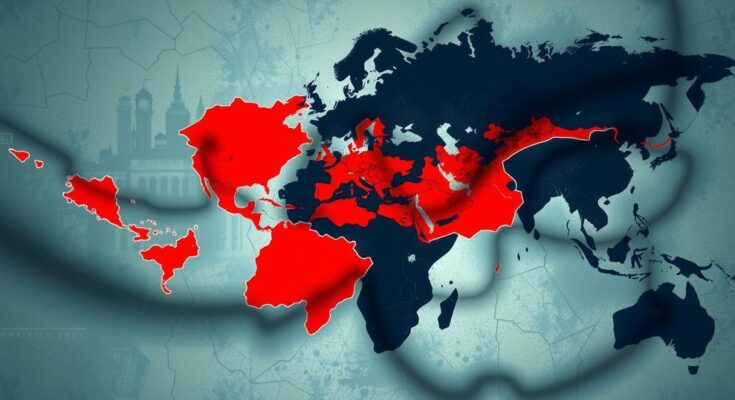President Donald Trump confirmed a large-scale strike by U.S. forces against Yemen’s Houthi militants, responding to attacks on U.S. interests in the Red Sea and issuing a warning to Iran. The military operations aim to destroy Houthi military capabilities and reflect a significant escalation in U.S. engagement in the region. The consequences may further strain U.S.-Iran relations and provoke potential retaliation from the Houthis.
On Saturday, President Donald Trump announced that U.S. forces launched significant strikes against Houthi militants in Yemen. This operation, described as “decisive and powerful,” aims to address escalating attacks on maritime traffic and American troops in the Red Sea, simultaneously issuing a stern warning to Iran, which supports the Houthis. U.S. naval forces targeted various military installations including radars and drone launch sites as part of a renewed strategy to diminish Houthi capabilities.
In a social media post, President Trump emphasized that the attack on American vessels “will not be tolerated” and pledged to use overwhelming force until the U.S. objectives are met. He also directed his comments toward Iran, demanding an immediate cessation of support for the Houthi militants. Trump warned of accountability for Iran’s actions, underscoring the serious military measures the U.S. is prepared to take.
The Houthis recently conducted attacks in the Red Sea reportedly in solidarity with Hamas, another militant group backed by Iran. Trump’s comments followed Iran’s refusal to engage in discussions regarding a new nuclear agreement, illustrating the complexities of U.S.-Iran relations. Despite previous military actions taken by the Biden administration against the Houthis, Trump criticized the prior efforts as “pathetically weak.”
Local media reported visible damage in Yemen’s capital, Sanaa, following the strikes, which include air and ground assaults on Houthi strongholds. U.S. Central Command confirmed these operations aim to “defend American interests, deter enemies, and restore freedom of navigation” in the region. Although the military’s announcements did not specify assessments of potential civilian casualties, the visibility of the strikes stirred concern among local observers.
President Trump’s dual approach toward Iran includes increasing economic pressure while extending negotiations on Iran’s nuclear activities. Despite Iran’s claims that its nuclear program is peaceful, the potential for escalated conflict remains as the International Atomic Energy Agency warns of closer paths to nuclear armament. The Trump administration has categorized the Houthis as a foreign terrorist organization due to their consistent aggression towards U.S. interests.
The Houthis, having established themselves as a significant power in Yemen since 2014, maintain a degree of operational independence from Tehran. Nonetheless, U.S. analysts indicate that while the Houthis receive backing from Iran, their actions can reflect their own strategic decisions. The recent military strikes exemplify how Trump may navigate military engagement during his presidency.
As military strikes against adversaries continue to unfold across the region, experts caution that the Houthis may respond with retaliatory actions targeting U.S. bases in the Middle East, escalating the conflict further. This current military engagement reflects a broader strategic framework within which Trump is operating and could have profound implications for regional security.
In summary, U.S. military actions against Houthi militants signify a marked increase in response to threats posed by the group and its Iranian backing. With continued military engagements and heightened rhetoric from President Trump, the implications for U.S.-Iran relations as well as regional stability may deepen. The ongoing conflict exemplifies the intertwined nature of various militant groups in the Middle East and the complexity of U.S. foreign policy in the region moves under Trump’s administration. The response from the Houthis could further complicate these dynamics.
Original Source: www.unionleader.com




